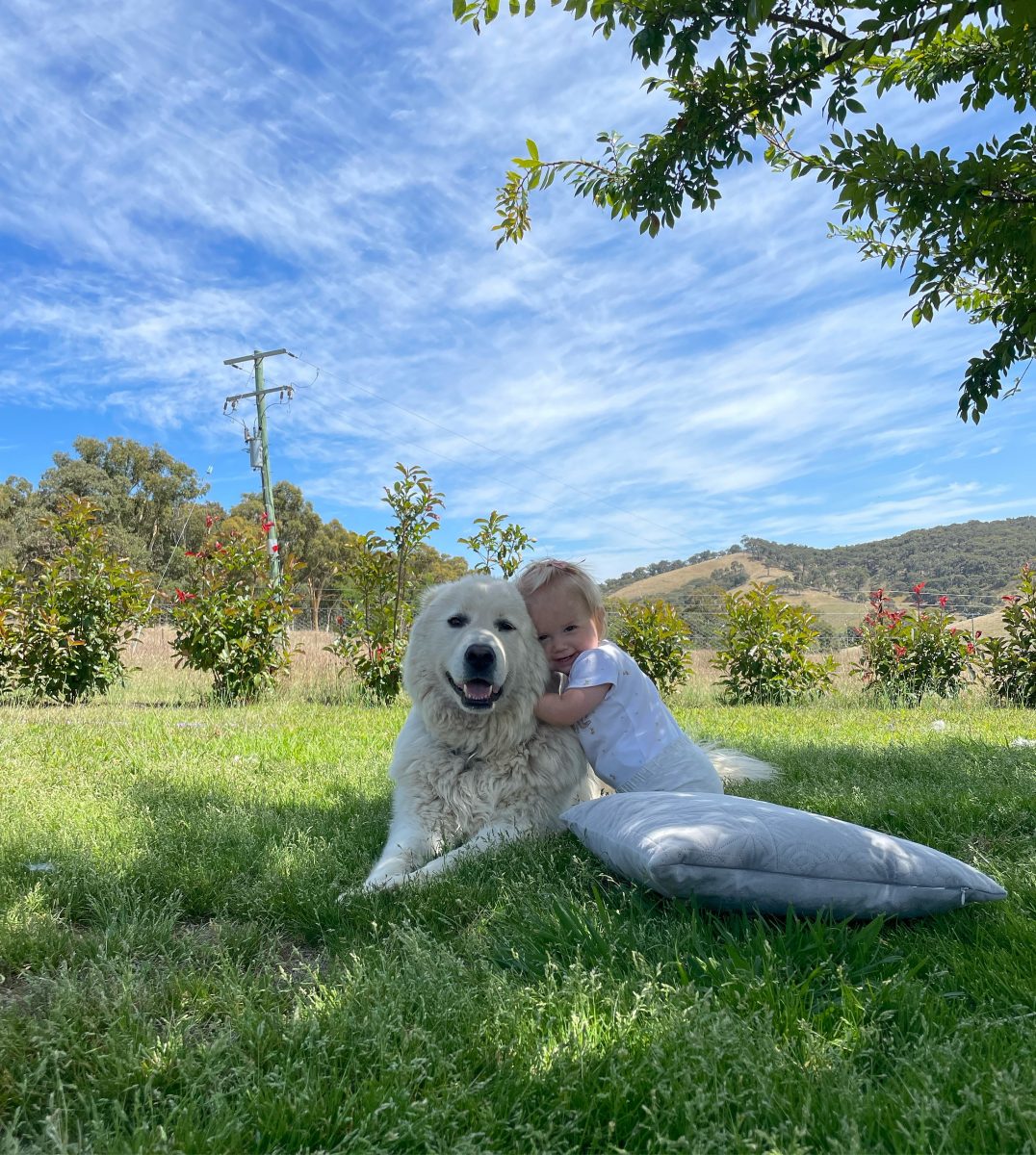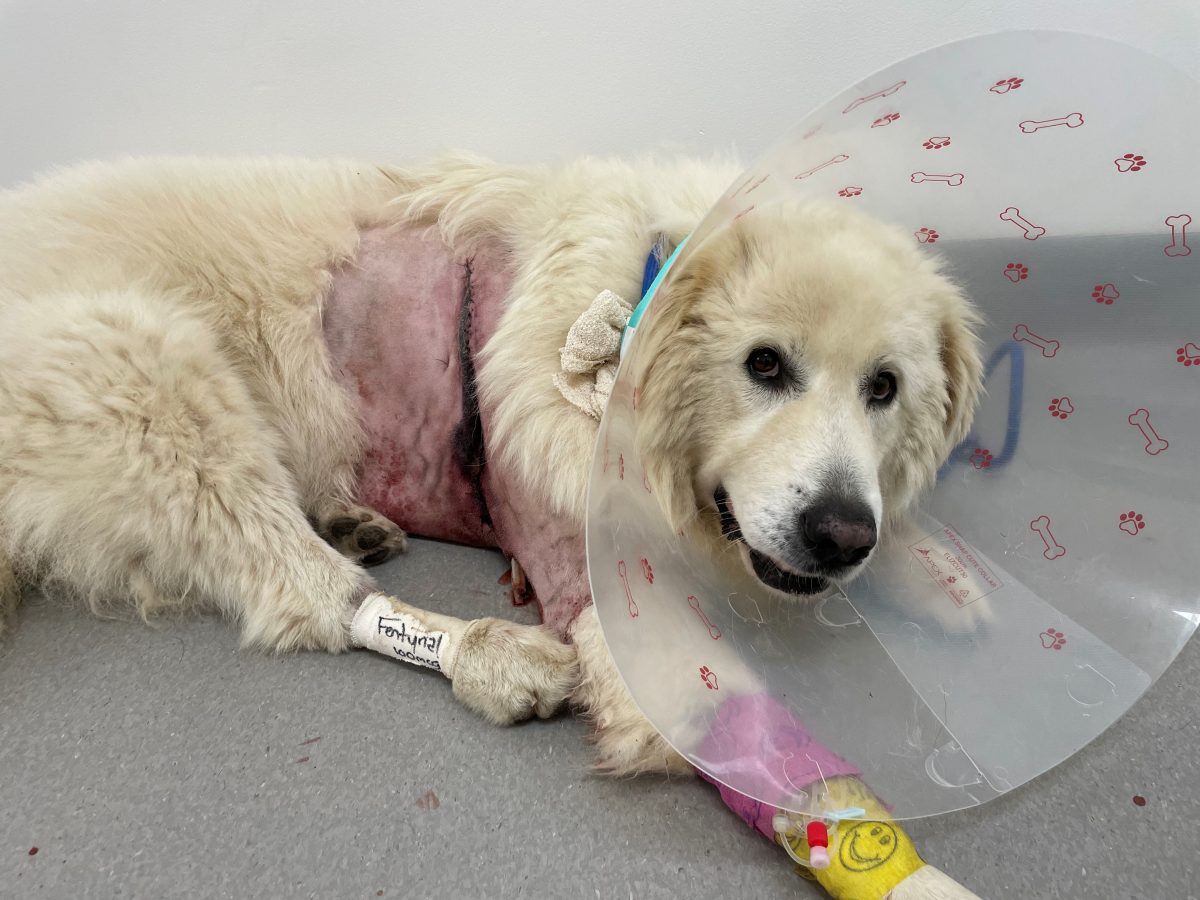
Leo the Maremma in happier times with his favourite human, Jordynn, daughter of his owner Lauren Bersinic from Murrumbateman. Photo: Supplied.
Had it not been for the quick action of his owner and his vet, Leo the Maremma probably wouldn’t be with his Murrumbateman family today.
Leo’s human, Lauren Bersinic, who says she loves the 50 kg dog as if he were a second child, noticed something wrong with him about a week ago when he went off his food.
He was lethargic and clearly not himself, so she felt around his body and discovered a lot of swelling under his right front leg. She took him to the vet the next day. The diagnosis: a grass seed had penetrated his skin, infiltrated his internal organs and turned septic.
Leo’s temperature was rising rapidly, as was his heart rate. The next day, Dr Eamon Ryan from Belconnen Veterinary Centre operated on Leo and removed shards of the grass seed, but not as a whole seed, so the fear was, Lauren said, that there might still be more inside.
“I was just hoping that the infection did not spread into his thoracic cavity; otherwise, I knew he would be in very big trouble,” Lauren said.
“I’ve come across grass seeds since we’ve been in Murrumbateman and I usually manage to get them out but not this time.
“The thing about them is that they’re so tiny yet they can do so much damage.”
Lauren said one of the things that kept her going throughout the crisis was the way the vets and staff dealt with Leo’s medical emergency.
Leo has to stay at the clinic until there’s no longer a risk of infection.
“I know he’s busting to get home,” she said, “but we just have to wait for him to heal.”
Laura said her daughter Jordynn was pining for the big dog.
“She keeps asking where he is. She loves animals … every night, she goes around to all of them saying good night individually – that’s when she keeps asking where he is.
“He is so wonderful with her, lets her crawl all over him. It’s so wonderful to see them together.”

Leo the Maremma recovers at the Belconnen vet clinic after a grass seed infiltrated his skin and nearly claimed his life. Photo: Supplied.
Laura said she had been visiting the clinic regularly to see Leo and to receive updates from staff.
“I gave one of the vet nurses a blanket from home, and as soon as they gave it to him, he sniffed it and even wagged his tail a bit.”
Laura said she was also overwhelmed by the support she and Leo received via social media after she posted his predicament on a Canberra site.
“I couldn’t believe how many people posted nice things – there were almost 2000,” she said.
“I was so shocked when I looked at my phone and saw so many responses from people.”
Dr Eamon Ryan of the Belconnen Veterinary Centre, who worked on Leo, said it was a timely warning for dog owners of the dangers of grass seeds, especially during late summer and autumn. He said just for this period, it was wise to keep them away from off-leash areas and on paths.
“If grass seeds enter an animal’s organ, they can be fatal,” he said.
“It’s rare, but it does happen. Especially if it gets to their lungs, it can cause an infection in the thoracic cavity.”
He said the most important factor when removing grass seeds from dogs was to ensure that every last piece was removed, but this was not always possible because they were so minuscule.
He said the common belief was that only long-haired dogs like Maremmas, huskies and german shepherds were more prone to catching grass seeds, but he said a study by Charles Sturt University in Wagga showed that many kelpies also suffered from the intrusion.
“With kelpies, they seem to literally inhale the grass seeds, and that’s often in the eye.”
Dr Ryan said, by design, grass seeds burrowed into what they latched onto and could ratchet their way deep into the skin.
He advised pet owners to regularly check their animals for the tiny seeds, particularly in ears and paws.
“We were very lucky,” Laura said.
“I don’t know what we’d have done if something had happened to Leo.”













